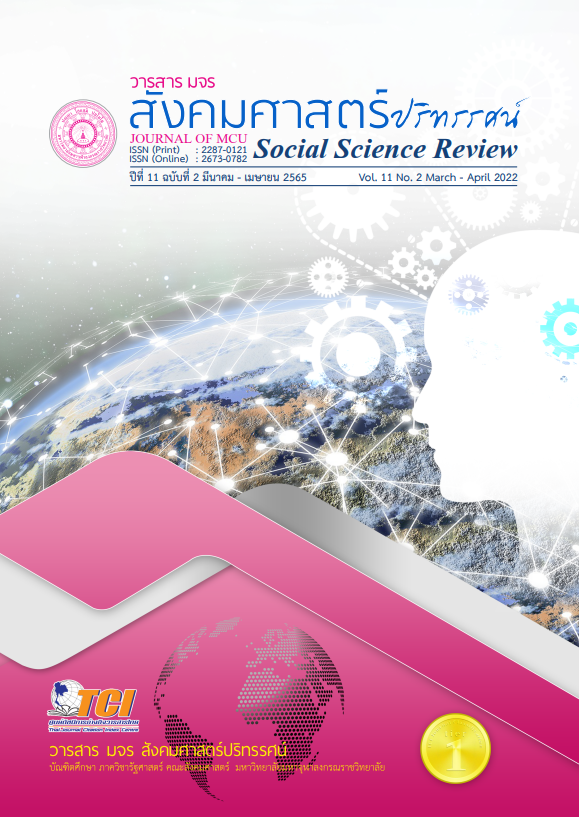รูปแบบการพัฒนาการมีส่วนร่วมของพระสงฆ์ในการอนุรักษ์ ศิลปวัฒนธรรมท้องถิ่นในจังหวัดราชบุรี
คำสำคัญ:
การมีส่วนร่วมของพระสงฆ์, การอนุรักษ์ศิลปวัฒนธรรมท้องถิ่น, จังหวัดราชบุรีบทคัดย่อ
บทความวิจัยนี้มีวัตถุประสงค์เพื่อศึกษาสภาพทั่วไป กระบวนการ และนำเสนอรูปแบบการพัฒนา เป็นการวิจัยเชิงคุณภาพ เก็บข้อมูลภาคสนามโดยการสัมภาษณ์เชิงลึกผู้ให้ข้อมูลสำคัญ 25 รูปหรือคน ได้ใช้แบบสัมภาษณ์แบบมีโครงสร้าง ที่มีค่าดัชนีวัดความเที่ยงตรงเชิงเนื้อหาทั้งฉบับ (S-CVI) เท่ากับ 1.00 และการสนทนากลุ่มเฉพาะร่วมกับผู้ทรงคุณวุฒิ 8 รูปหรือคน ใช้แบบสนทนากลุ่มเฉพาะ วิเคราะห์ข้อมูลด้วยเทคนิคการวิเคราะห์เนื้อหาประกอบบริบท
ผลการวิจัยพบว่า 1. พระสงฆ์มีมรดกทางศิลปวัฒนธรรมท้องถิ่นที่ทรงคุณค่าทางประวัติศาสตร์อยู่ภายในวัดจำนวนมาก 2. พระสงฆ์ได้เปิดโอกาสให้ผู้มีส่วนได้ส่วนเสียในพื้นที่มีส่วนร่วมกำหนดนโยบายและแผนงาน เป็นผู้นำในการดำเนินงานโดยเน้นความถูกต้องตามหลักพระธรรมวินัยและไม่ขัดต่อกฎหมายของรัฐ ประเมินความคุ้มค่าโดยเปรียบเทียบผลลัพธ์ที่ได้กับงบประมาณหรือทรัพยากรที่สูญเสียไป มีส่วนร่วมในการแก้ไขปัญหาต่าง ๆ ตามลำดับความจำเป็นก่อนหลังและความจำเป็นเร่งด่วน 3. รูปแบบของการมีส่วนร่วมในกระบวนการดำเนินงานเพื่อแก้ไขปัญหาและพัฒนาการอนุรักษ์ศิลปวัฒนธรรมท้องถิ่น โดยใช้จุดแข็งไปผลักดันโอกาส ใช้โอกาสลดจุดอ่อน ใช้จุดแข็งรับมืออุปสรรค และแก้ไขจุดอ่อนพร้อมกับหลีกเลี่ยงอุปสรรคต่าง ๆ ในกระบวนการอนุรักษ์ศิลปวัฒนธรรมท้องถิ่นในจังหวัดราชบุรี โดยบูรณาการหลักทิฏฐธัมมิกัตถสังวัตตนิกธรรมทั้ง 4 ด้าน
เอกสารอ้างอิง
กัญญาณัฐ จงมีสุข. (2558). รูปแบบการมีส่วนร่วมของผู้บริหารในการจัดวางระบบการควบคุมภายในของมหาวิทยาลัยมหาจุฬาลงกรณราชวิทยาลัย (วิทยานิพนธ์ปริญญาพุทธศาสตรดุษฎีบัณฑิต สาขาวิชารัฐประศาสนศาสตร์). พระนครศรีอยุธยา: มหาวิทยาลัยมหาจุฬาลงกรณราชวิทยาลัย.
เปรมรัศมี ธรรมรัตน์ และธีรศักดิ์ อุ่นอารมณ์เลิศ. (2553). การวิเคราะห์คุณค่าและการดำรงอยู่ของศิลปวัฒนธรรมพื้นบ้าน: กรณีศึกษาหนังใหญ่วัดขนอน อำเภอโพธาราม จังหวัดราชบุรี. วารสารศิลปากรศึกษาศาสตร์วิจัย, 1(2), 153.
พระครูใบฎีกาสอาด ปญฺญาทีโป. (2558). รูปแบบการมีส่วนร่วมของพระสงฆ์ในการส่งเสริมคุณภาพชีวิตในชุมชนในเขตปกครองคณะสงฆ์ภาค 2 (วิทยานิพนธ์ปริญญาพุทธศาสตรดุษฎีบัณฑิต สาขาวิชาการจัดการเชิงพุทธ. พระนครศรีอยุธยา: มหาวิทยาลัยมหาจุฬาลงกรณราชวิทยาลัย.
พระครูสิริสุตานุยุต (สมาน จนฺทรํสี). (2561). การมีส่วนร่วมในการกำหนดนโยบายสาธารณะด้านการศึกษาพระพุทธศาสนาและศิลปวัฒนธรรมของเครือข่ายชาวพุทธ จังหวัดลำพูน (รายงานการวิจัย). พระนครศรีอยุธยา: มหาวิทยาลัยมหาจุฬาลงกรณราชวิทยาลัย.
พระพรหมเวที (สุเทพ ผุสฺสธมฺโม). (2561). กระบวนการมีส่วนร่วมอนุรักษ์ศิลปวัฒนธรรมเพื่อการอยู่ร่วมกันอย่างสันติของกลุ่มชาติพันธุ์ในภาคตะวันตก (รายงานการวิจัย. พระนครศรีอยุธยา: มหาวิทยาลัยมหาจุฬาลงกรณราชวิทยาลัย.
พระราชญาณวิสิฐ (เสริมชัย ชยมงฺคโล). (2552). การบริหารวัด (พิมพ์ครั้งที่ 5). กรุงเทพฯ: เอสทีพีเพรส จำกัด.
พระศรีรัตนมุนี (ขวัญรัก มหาวายาโม). (2559). การเสริมสร้างคุณธรรมจริยธรรมของเยาวชนโดยใช้ทุนวัฒนธรรมท้องถิ่น (รายงานการวิจัย). พระนครศรีอยุธยา: มหาวิทยาลัยมหาจุฬาลงกรณราชวิทยาลัย.
สถาบันพระปกเกล้า. (2550). วัดระดับการบริหารจัดการที่ดี (พิมพ์ครั้งที่ 3). นนทบุรี : บริษัท พิมพ์ดี จำกัด.
สุรสวัสดิ์ ศุขสวัสดิ์. (2542). การอนุรักษ์ศิลปกรรม. เชียงใหม่: คณะวิจิตรศิลป์ มหาวิทยาลัยเชียงใหม่.
อาษา ศรีประวัติ. (2558). การพัฒนาการมีส่วนร่วมทางการเมืองแบบประชาธิปไตยระดับท้องถิ่นตามหลักพุทธธรรมของประชาชนในเขตภาคตะวันออก (วิทยานิพนธ์ปริญญาพุทธศาสตรดุษฎีบัณฑิต สาขาวิชารัฐประศาสนศาสตร์). พระนครศรีอยุธยา: มหาวิทยาลัยมหาจุฬาลงกรณราชวิทยาลัย.
ดาวน์โหลด
เผยแพร่แล้ว
รูปแบบการอ้างอิง
ฉบับ
ประเภทบทความ
สัญญาอนุญาต
ลิขสิทธิ์ (c) 2022 วารสาร มจร สังคมศาสตร์ปริทรรศน์

อนุญาตภายใต้เงื่อนไข Creative Commons Attribution-NonCommercial-NoDerivatives 4.0 International License.
เพื่อให้เป็นไปตามกฎหมายลิขสิทธิ์ ผู้นิพนธ์ทุกท่านต้องลงลายมือชื่อในแบบฟอร์มใบมอบลิขสิทธิ์บทความให้แก่วารสารฯ พร้อมกับบทความต้นฉบับที่ได้แก้ไขครั้งสุดท้าย นอกจากนี้ ผู้นิพนธ์ทุกท่านต้องยืนยันว่าบทความต้นฉบับที่ส่งมาตีพิมพ์นั้น ได้ส่งมาตีพิมพ์เฉพาะในวารสาร มจร สังคมศาสตร์ปริทรรศน์ เพียงแห่งเดียวเท่านั้น หากมีการใช้ภาพหรือตารางหรือเนื้อหาอื่นๆ ของผู้นิพนธ์อื่นที่ปรากฏในสิ่งตีพิมพ์อื่นมาแล้ว ผู้นิพนธ์ต้องขออนุญาตเจ้าของลิขสิทธิ์ก่อน พร้อมทั้งแสดงหนังสือที่ได้รับการยินยอมต่อบรรณาธิการ ก่อนที่บทความจะได้รับการตีพิมพ์ หากไม่เป็นไปตามข้อกำหนดเบื้องต้น ทางวารสารจะถอดบทความของท่านออกโดยไม่มีข้อยกเว้นใดๆ ทั้งสิ้น





